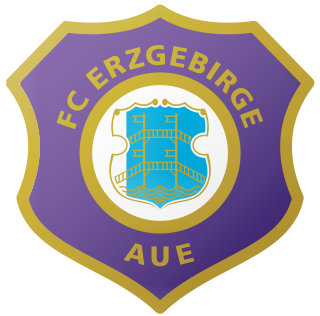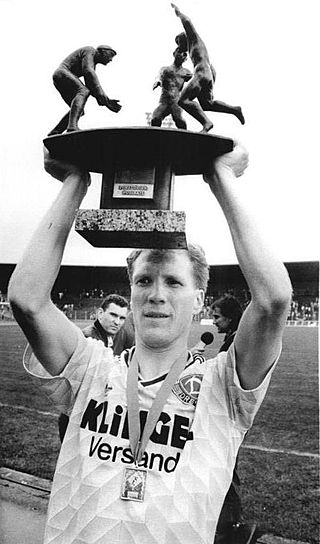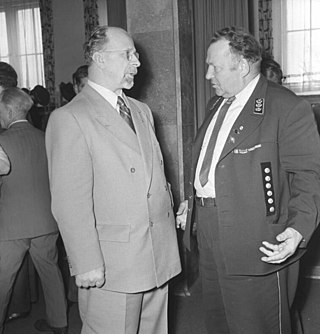Related Research Articles

Fußball Club Erzgebirge Aue e.V., commonly known as simply FC Erzgebirge Aue or Erzgebirge Aue, is a German football club based in Aue-Bad Schlema, Saxony. The former East German side was a founding member of the 3. Liga in 2008–09, after being relegated from the 2. Bundesliga in 2007–08. The city of Aue-Bad Schlema has a population of about 20,800, making it one of the smallest cities to ever host a club playing at the second highest level of German football. However, the team attracts supporters from a larger urban area that includes Chemnitz and Zwickau, whose own football sides are among Aue's traditional rivals.

The FDGB-Pokal was an elimination football tournament held annually in East Germany. It was the second most important national title in East German football after the DDR-Oberliga championship. The founder of the competition was East Germany's major trade union.
Trade unions in Germany have a history reaching back to the German revolution in 1848, and still play an important role in the German economy and society.
The 1956 DDR-Oberliga was the eighth season of the DDR-Oberliga, the first tier of league football in East Germany. Rather than in the traditional autumn-spring format the Oberliga played for six seasons from 1955 to 1960 in the calendar year format, modelled on the system used in the Soviet Union. From 1961–62 onwards the league returned to its traditional format.
The 1966–67 DDR-Oberliga was the 18th season of the DDR-Oberliga, the first tier of league football in East Germany.

Dieter Erler was a German footballer.
Claus Kreul is a former football player and manager. He played in the DDR-Oberliga for FC Karl-Marx-Stadt and BSG Wismut Aue and later managed several Oberliga teams.
Lothar Lindner is a former German trade union leader. He was chairman of the central committee of the building and timber industry union in the East German Free German Trade Union Federation and President of the International Federation of Unions in the building, timber and building materials industries in the World Federation of Trade Unions (WFTU).

Josef Wenig was a German labour and political activist (KPD). After 1945 he became an important figure in the East German political establishment. He was a member of the ruling party's powerful Central Committee between 1954 and his death in 1981. He was also a member of the country's National Parliament ("Volkskammer") between 1950 and 1981.
The Union of Mining and Energy was a trade union in West Germany which existed from 1946 until 1997.
The Chemical, Paper and Ceramic Union was a trade union representing chemical, oil refinery, paper, rubber, ceramics, glass and plastics workers in West Germany.
The Industrial Union of Metal was a trade union representing workers in the metal and electronic industries in East Germany.
Reinhard Sommer is a German former trade union leader.
The Industrial Union of Textiles, Clothing and Leather was a trade union representing workers in the textile, clothing, leather, and tobacco industries in East Germany.
The Industrial Union of Transport and Communication was a trade union representing workers in the transport and communication sectors in East Germany.
The Industrial Union of Mining and Energy was a trade union representing the mining, energy and water industries in East Germany.
The Industrial Union of Construction and Wood was a trade union representing construction and wood workers in East Germany.
The Industrial Union of Printing and Paper was a trade union representing workers in the printing industry in East Germany.
The 1959 FDGB-Pokal was the eleventh edition of the FDGB-Pokal. The competition started with a qualifying round comprising the 30 finalists of the 15 regional district cups, 54 teams from the third tier II. DDR-Liga and 14 teams from the second tier DDR-Oberliga. The winners of the qualifying round then met the 14 teams from the first tier DDR-Oberliga in the First round.
References
- 1 2 "IG Wismut (1950-90)". FDGB-Lexikon. Freidrich Ebert Stiftung. Retrieved 14 July 2020.
- ↑ Karl-Peter Fleischer: Das Orchester der IG Wimut und seine Dirigenten. Eigenverlag, Chemnitz 2009, ISBN 978-3-00-026661-4